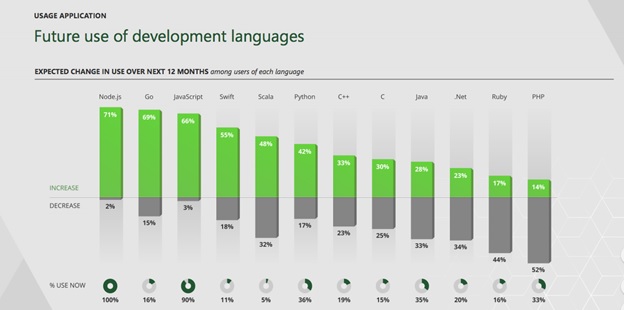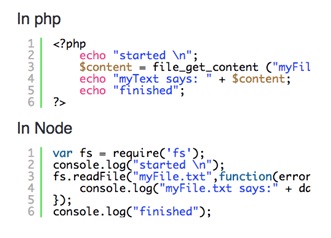What is Node.js?
Node.js is an open source, cross-platform used to make real-time network applications. According to nodejs.org, it uses an event-driven, non-blocking I/O model that makes it lightweight and efficient. It remains lightweight in terms of in-memory usage to data-intensive real-time web apps that run on other various devices. Node.js uses push technology rather than web sockets for producing server-side web applications with two-way connections. Node.js uses open web stack technologies like JavaScript, HTML, and CSS that runs over the standard port 80.
According to the 2017 Node.js User Survey Report, Node.js has about 7 million users and an annual growth rate of 100%. In the chart below, you can see that Node.js is expected to show a 71% increase in use over the next 12 months, which is the highest percentage compared to other programming languages. The image below represents the results found from 64,000 developers who took the annual survey in January 2017.

Node.js is growing in popularity because developers are continuously drawn to the benefits of using Node.js which includes speed, ease of use, full stack ability, asynchronous programming, community, and modules available. Node.js isn’t going anywhere anytime soon, so as a developer you should understand the advantages of using Node.js for web application development.
Here’s a quick breakdown:
- Speed and Ease of Use
Node.js uses the V8 engine developed by Google, which compiles JavaScript into native machine code and runs extremely fast. Usually, I/O operations run either synchronously or asynchronously by sending parallel threads to perform the work. Node.js runs on a single thread, also known as an event loop, so it doesn’t get jumbled up with creating separate threads of operations, which ultimately generates faster results.
Common tasks in web applications like reading or writing a database, network connections and a filesystem can be done quicker using Node.js.The versatility to make front-end, back-end, clip and everything in between, the agility of getting the program running and the quality of performance are the prime reasons behind the popularity of this programming language.
- Full Stack Ability
Front-end and back-end web applications can be developed in Node.js. The full stack ability that Node.js offers to eliminate the process of hiring a separate developer for back-end and front-end development. This aspect of Node.js contributes to the ease of adding, modifying or deleting data in your database through the program by keeping front-end and back-end programming consistent.
Node.js allows developers to write JavaScript on the server and the client side. Developers can keep data in its native format from the browser to the disk. Eliminating all the translating from client data to server data contributes to Node.js’ ease of use from a developer’s standpoint.
- Asynchronous Programming
Node.js uses asynchronous programming, where a unit of work runs separately from the main application thread and notifies the calling thread of its completion, failure, or process. When a Node.js web application needs to perform an I/O operation, it sends an asynchronous, or non-blocking task to the event loop, along with a callback function and then continues to work on the rest of its program. Once the asynchronous operation is completed, the event loop returns back to the task.
This notion eliminates waiting and continues with the next request. Asynchronous programming can provide an improved application performance and responsiveness. The asynchronous event-driven IO helps with concurrent request handling. It allows numerous requests concurrently, in which incoming requests are executed successively in a fast manner.
This non-blocking code approach allows Node.js to start reading a file, assign a callback to it, and proceed on to the next file. Other development platforms can start reading a file and cannot do anything else until the platform finishes reading that file. An example showing this provided by Paul Shan at Void Canvas can be found below:

As seen in the PHP coding above, it starts reading the file and can’t do anything else until the file has finished up. On the other hand, in line #3 of Node, it starts reading the file and assigns a callback to it, then proceeds to the next line. This aspect allows fast processing of necessary statements because Node.js can move on to reading other files before the file that it is working on has finished reading. This is one of the main reasons to use Node.js for developing web apps.
- Numerous Modules Available
Node.js encourages sharing, which has resulted in an active community with lots of code shared throughout the internet. Node Package Manager (NPM), provides available and reusable code within teams and is the largest collection of open source libraries in the world. The NPM community is very active with over 400,000 modules available. Developers can manage public or private code and dependencies in their projects. There are a number of websites that can be used to discover or share code that will help in the development process. Common forums used to communicate and discover code from other Node.js developers are Github and Stackoverflow.
These forums allow users to receive instant interactions and real-time notifications with other developers, as well as provide a wide array of plugins that would be a great starting point for new developers to learn a codebase. The community interaction can save developers time, stress and energy. As a developer, there are many resources that can be used to obtain source code and take advantage of JavaScript’s strong file stream capabilities.
Conclusion
Node.js. has proven to be a leader of programming languages and it continues to grow in popularity.
Node.js offers full stack ability of front-end and back-end development on one platform, which eliminates the need to hire two separate developers for front-end and back-end code. Node.js uses asynchronous programming that provides improved application performance and responsiveness by helping with concurrent request handling. Node.js includes built-in modules, as well as a vibrant community of resources that can be utilized as tools for achieving web application development.
Several developers are opening up to the thought of using Node.js for web app development because of affirmative reasons like the ones reviewed above. If the above mentioned top benefits have convinced you of using Node.js for your web app project, the next step is to explore the list of top Node.js development companies and pick a name that best suits your requirements.








